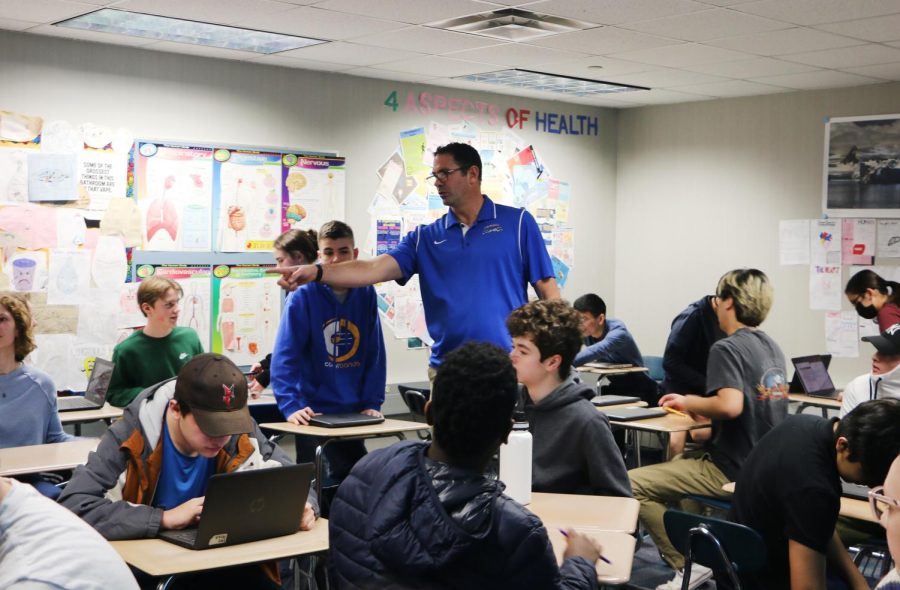Junior Gabrielle “Gabby” Aitken is one of many students who has taken this school’s required health and wellness education class. Among other topics, teachers in this course go over the topic of sex education, but Aitken said she felt the instruction was lacking.
“I mean, the entirety of (the unit) was essentially (teaching) abstinence and they didn’t really teach much else,” she said. “I think they might have briefly mentioned condoms, but ultimately the whole form of birth control was just abstinence. They were like, ‘If you don’t want to have kids, then don’t have sex.’”
However, Adam Havice, health and wellness teacher, said the bigger issue lies with the instructions from the Indiana Department of Education (IDOE). He said the school is required by the state to meet certain standards in regard to sex education.
“Accredited schools must meet the following criteria: Require a teacher to teach abstinence from sexual activity outside of marriage as the expected standard for all school-age children; include in the instruction that abstinence from sexual activity is the only certain way to avoid out-of-wedlock pregnancy, STDs and other associated health problems; and include in the instruction that the best way to avoid STDs and other associated health problems is to establish a mutually faithful monogamous relationship in the context of marriage,” Havice said via email.
According to CHS, individual school administrators do not decide what they can and cannot teach in school; these requirements, as Havice mentioned, come from the IDOE, and, in fact, Holly Lawson, deputy director of communications at the IDOE, said Indiana does not even require sex education to be taught in public schools. If it does, she said the school must meet certain requirements.
“If a school elects to teach sex education, per IC 20-30-5-13, it must be based on abstinence and schools are required to get parental consent,” Lawson said.
Junior Ben Boyce, who took interpersonal relations his sophomore year, said this information surprised him.
“I don’t think (teaching abstinence-only sex education) is a very good idea,” he said. “I mean, kids are going to have sex in their teen years anyways. So, I think teaching (abstinence-only) is kind of dodging around the question, skirting around the issue that’s at hand. That’s why I don’t think it’s smart to teach abstinence-only (education) and stuff like that. It’s not going to stop sex; it’s just going to make it less safe.”

After the recent reversal of the U.S. Supreme Court decision in Roe v. Wade, which legalized abortions, Aitken said she hoped the IDOE would implement changes to the sex education standards to promote safe sex and prevent teen pregnancies or STI infections.
“If (the IDOE) is going to be so fixated on abstinence and not teach us about how to prevent pregnancy when we do have sex, they should recognize that their lack of teaching is going to lead to more teen pregnancy,” she said. “I mean, (the health and wellness class) addressed things like contraception, but it wasn’t to the depth that it needed to be because they didn’t really explain any of the processes of having sex or how to use (contraception).”
Boyce also said he believes Indiana needs to implement comprehensive sex education to reduce teenage pregnancy rates.
“If we want to reduce the amount of teen pregnancies and, therefore, teenage abortions, then we have to have comprehensive sex ed,” Boyce said. “Especially with the reversal of Roe v. Wade, regardless of your stance on it, you have to recognize there are less people having access to abortion which means that there are less teenagers having access to abortion. It’s always been important, but now more than ever, it’s really important to make sure that teenage pregnancies are not happening.”
Boyce said he believes the sex education curriculum should be expanded to be medically accurate and require more contraceptive instruction.
“We need to be teaching the facts. What you see is that with all the states that teach abstinence-only (sex education), it just so happens that those are the states that you see have the highest teenage pregnancy rates,” he said. “(Sex education) shouldn’t be teaching kids that you shouldn’t have sex, it’s about how to have safer sex.”
For now, though, Havice said he doesn’t see there being any changes to the current curriculum, and although Aitken and Boyce have concerns about sex education at CHS, they said they still see benefits within the current curriculum.
“I do remember (the teachers) talking about consent,” Aitken said, “which made me very happy because while they focused on abstinence, they definitely also talked about consent. They talked about if someone is obviously under the influence, then don’t pursue or force anything on them. That was something I greatly appreciated.”
This aspect of the curriculum branches from the Creating Positive Relationships program, which was established in 1990. The organization focuses on teaching young people to make healthy life choices and have safe relationships through abstinence-centered education.
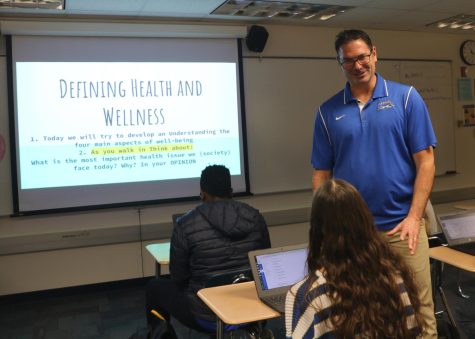
“(The teacher) had a guy from the health department come in and talk about STIs, and that was helpful just because it talked about the consequences of them,” Aitken said.
Despite its limitations, Havice said he feels like the current program follows state laws and is a comprehensive, culturally responsive and inclusive program.
“Hopefully, it helps prevent intimate partner violence and helps young people develop healthy relationships of any kind,” he said.
But despite those positive aspects of this school’s current sex education, students like Aitken and Boyce said the curriculum is restricted to limited information, and improvements are needed.
“I know that abstinence is the most total way to prevent (pregnancy or STI infection), but I don’t think teaching (abstinence-only) is the most effective,” Boyce said.
Aitken said, “A majority of high school students would like to know all of their options, which they don’t necessarily get with a typical sex education…I think a lot of it needs to change and be something more realistic and accurate than it is because right now it’s very idealistic.”
On Thursday, Jan. 19, the Indiana Supreme Court heard arguments on Indiana’s abortion laws. Learn more here.











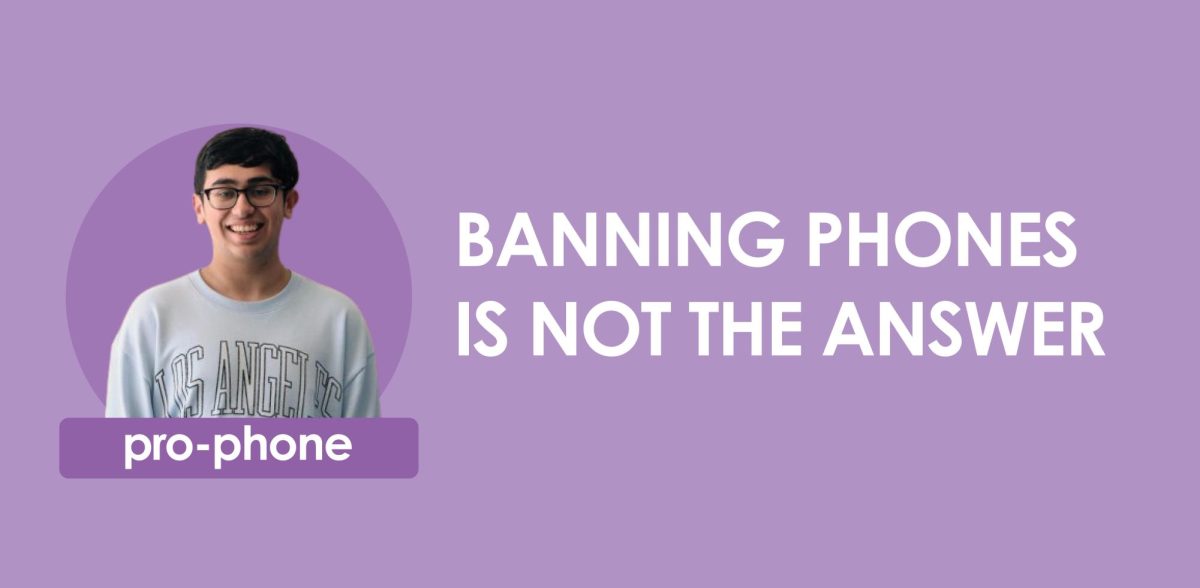
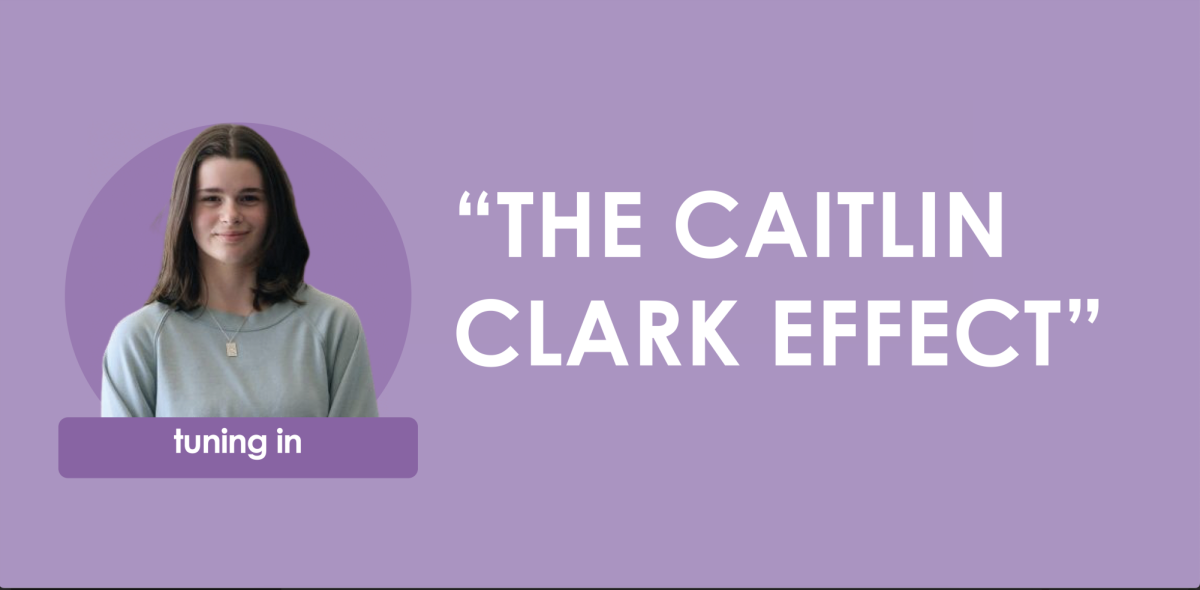

















![Family vlogger controversy, need for content reform [opinion]](https://hilite.org/wp-content/uploads/2024/05/Screenshot-2024-05-14-11.33.37-AM-1200x465.png)





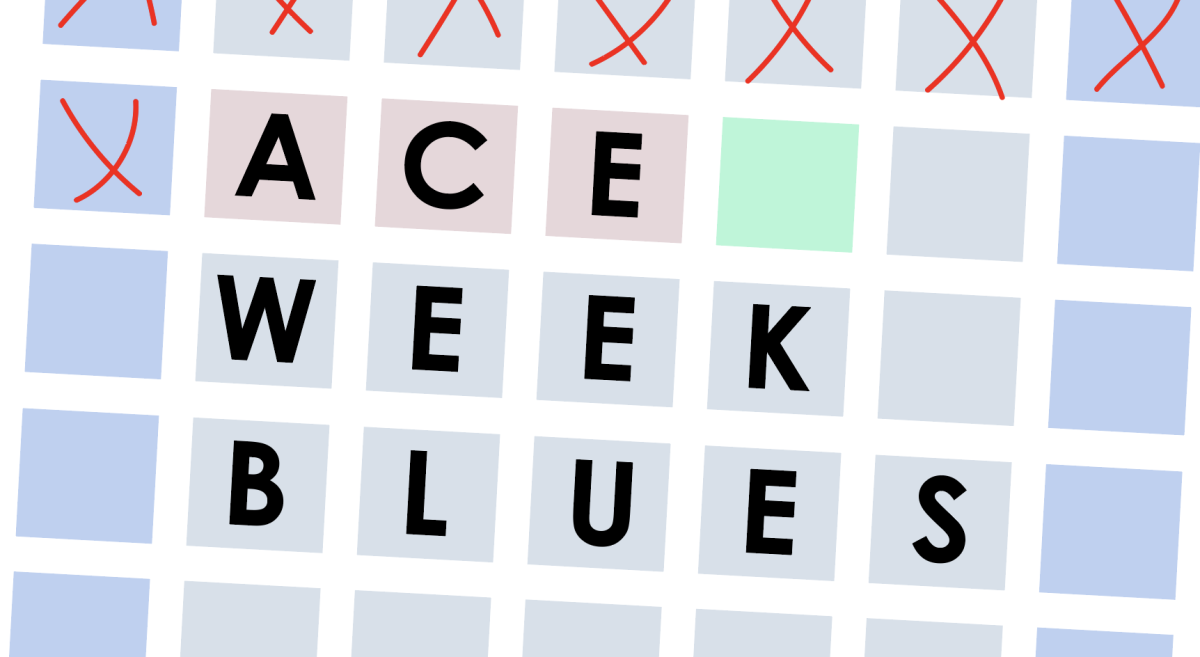






















![Review: Taylor Swift’s new album The Tortured Poets Department is not her best work but is still a brilliant album [MUSE]](https://hilite.org/wp-content/uploads/2024/05/The-Anthology_Cover-1200x675.webp)
![Review: Challengers does it all [MUSE]](https://hilite.org/wp-content/uploads/2024/05/challengers-poster-1200x600.png)
![Review: A House of Flame and Shadow by Sarah J. Maas was a disappointing read [MUSE]](https://hilite.org/wp-content/uploads/2024/05/house-of-flame-and-shadow-feature.png)
![Review: Conan Gray’s new album, “Found Heaven”, is a refreshing twist on modern music [MUSE]](https://hilite.org/wp-content/uploads/2024/05/Screenshot-2023-10-31-at-16.01.05.webp)
![Review: “Bodies, Bodies, Bodies” is the quintessential Gen-Z movie [MUSE]](https://hilite.org/wp-content/uploads/2024/05/Screenshot-2024-05-15-140618.png)
![Review in Print: Maripaz Villar brings a delightfully unique style to the world of WEBTOON [MUSE]](https://hilite.org/wp-content/uploads/2023/12/maripazcover-1200x960.jpg)
![Review: “The Sword of Kaigen” is a masterpiece [MUSE]](https://hilite.org/wp-content/uploads/2023/11/Screenshot-2023-11-26-201051.png)
![Review: Gateron Oil Kings, great linear switches, okay price [MUSE]](https://hilite.org/wp-content/uploads/2023/11/Screenshot-2023-11-26-200553.png)
![Review: “A Haunting in Venice” is a significant improvement from other Agatha Christie adaptations [MUSE]](https://hilite.org/wp-content/uploads/2023/11/e7ee2938a6d422669771bce6d8088521.jpg)
![Review: A Thanksgiving story from elementary school, still just as interesting [MUSE]](https://hilite.org/wp-content/uploads/2023/11/Screenshot-2023-11-26-195514-987x1200.png)
![Review: When I Fly Towards You, cute, uplifting youth drama [MUSE]](https://hilite.org/wp-content/uploads/2023/09/When-I-Fly-Towards-You-Chinese-drama.png)
![Postcards from Muse: Hawaii Travel Diary [MUSE]](https://hilite.org/wp-content/uploads/2023/09/My-project-1-1200x1200.jpg)
![Review: Ladybug & Cat Noir: The Movie, departure from original show [MUSE]](https://hilite.org/wp-content/uploads/2023/09/Ladybug__Cat_Noir_-_The_Movie_poster.jpg)
![Review in Print: Hidden Love is the cute, uplifting drama everyone needs [MUSE]](https://hilite.org/wp-content/uploads/2023/09/hiddenlovecover-e1693597208225-1030x1200.png)
![Review in Print: Heartstopper is the heartwarming queer romance we all need [MUSE]](https://hilite.org/wp-content/uploads/2023/08/museheartstoppercover-1200x654.png)






















![Review: “Ginny & Georgia” is a dramatic and poorly made emotional rollercoaster–and I loved it anyway [MUSE]](https://hilite.org/wp-content/uploads/2024/03/ginny-and-georgia-season2-main-be37bbb9487a41e88b3f66c3baacd5c3-300x177.jpg)
![Review: Witch Hat Atelier is a masterpiece in art and world-building, but the story has only begun [MUSE]](https://hilite.org/wp-content/uploads/2024/01/unnamed-211x300.png)
![Review: “Mysterious Lotus Casebook” is an amazing historical Chinese drama [MUSE]](https://hilite.org/wp-content/uploads/2024/03/0-300x170.webp)
![Review: “A Little Life” by Hanya Yanagihara is the epitome of a heartwrenching masterpiece [MUSE]](https://hilite.org/wp-content/uploads/2024/01/unnamed-5-300x200.png)


